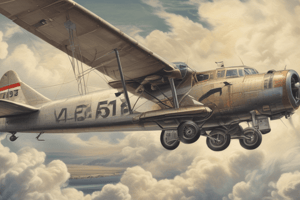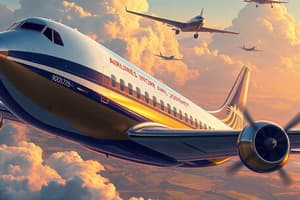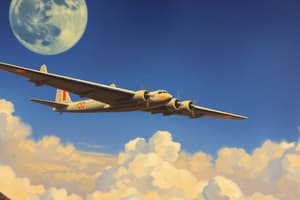Podcast
Questions and Answers
What was a significant advantage of airmail compared to traditional mail methods?
What was a significant advantage of airmail compared to traditional mail methods?
- Airmail allowed for more secure delivery of packages.
- Airmail was more cost-effective for the postal service.
- Airmail ensured that less mail was lost during transit.
- Airmail provided faster delivery to remote areas. (correct)
Which purpose did beacons serve in the transcontinental airway system?
Which purpose did beacons serve in the transcontinental airway system?
- To provide automated flight instructions.
- To help pilots navigate by emitting light and signals. (correct)
- To mark boundaries of no-fly zones.
- To communicate with ground control during flights.
Before powered flight, which of the following methods was NOT used for airmail transportation?
Before powered flight, which of the following methods was NOT used for airmail transportation?
- Riverboat (correct)
- Stagecoach
- Horseback
- Train
What was one of the main reasons for the introduction of bi- and tri-wing designs in airplanes?
What was one of the main reasons for the introduction of bi- and tri-wing designs in airplanes?
What was the primary function of the interrupter gear in early aircraft?
What was the primary function of the interrupter gear in early aircraft?
What materials were predominantly used in the construction of early aircraft, excluding the engine?
What materials were predominantly used in the construction of early aircraft, excluding the engine?
How did modern airline travel improve compared to the first commercial flight in 1914?
How did modern airline travel improve compared to the first commercial flight in 1914?
What made Bessie Coleman notable in aviation history?
What made Bessie Coleman notable in aviation history?
What feature of modern commercial airlines significantly differentiates them from the Benoist Model XIV flights?
What feature of modern commercial airlines significantly differentiates them from the Benoist Model XIV flights?
What was a significant factor that contributed to the failure of the first commercial airline in the United States?
What was a significant factor that contributed to the failure of the first commercial airline in the United States?
Why was Rosie the Riveter considered a pivotal symbol in American history during World War II?
Why was Rosie the Riveter considered a pivotal symbol in American history during World War II?
What was a primary purpose behind the U.S. Postal Service's development of airways marked by beacons?
What was a primary purpose behind the U.S. Postal Service's development of airways marked by beacons?
What advantage did the bent wings of the F-4U Corsair offer to pilots?
What advantage did the bent wings of the F-4U Corsair offer to pilots?
How did the development of pressurized cabins affect aerial combat during World War II?
How did the development of pressurized cabins affect aerial combat during World War II?
What barriers faced women seeking careers in aviation during the early 1900s?
What barriers faced women seeking careers in aviation during the early 1900s?
What distinguishes the Tuskegee Airmen's contribution to African American civil rights?
What distinguishes the Tuskegee Airmen's contribution to African American civil rights?
What was the major technological advancement aimed for during World War I regarding aircraft engines?
What was the major technological advancement aimed for during World War I regarding aircraft engines?
What role did Women Airforce Service Pilots (WASPs) assume after World War II?
What role did Women Airforce Service Pilots (WASPs) assume after World War II?
Flashcards
What was the significance of airmail?
What was the significance of airmail?
Airmail revolutionized communication by enabling faster delivery of mail over long distances, especially to remote areas.
How did beacons help pilots navigate?
How did beacons help pilots navigate?
Beacons were used along the airway to guide pilots at night and during the day, providing crucial navigation when landmarks were invisible.
What methods were used to transport airmail before powered flight?
What methods were used to transport airmail before powered flight?
Before powered flight, mail was transported by horseback, stagecoach, and train, resulting in slower and less efficient delivery compared to airplanes.
Why were bi- and tri-wing designs introduced?
Why were bi- and tri-wing designs introduced?
Signup and view all the flashcards
What is the purpose of the interrupter gear?
What is the purpose of the interrupter gear?
Signup and view all the flashcards
What materials were used to build early aircraft?
What materials were used to build early aircraft?
Signup and view all the flashcards
Compare benefits of modern airline travel to early flights.
Compare benefits of modern airline travel to early flights.
Signup and view all the flashcards
How did early commercial flights change travel between Tampa and St. Petersburg?
How did early commercial flights change travel between Tampa and St. Petersburg?
Signup and view all the flashcards
How did the Benoist Model XIV compare to modern commercial airlines?
How did the Benoist Model XIV compare to modern commercial airlines?
Signup and view all the flashcards
What did the U.S. Postal Service develop to help pilots navigate during early airmail delivery?
What did the U.S. Postal Service develop to help pilots navigate during early airmail delivery?
Signup and view all the flashcards
Why did the first commercial airline fail?
Why did the first commercial airline fail?
Signup and view all the flashcards
Who operated the first commercial airmail delivery system?
Who operated the first commercial airmail delivery system?
Signup and view all the flashcards
What were the roles of Women Airforce Service Pilots (WASPs) during World War II besides ferrying aircraft?
What were the roles of Women Airforce Service Pilots (WASPs) during World War II besides ferrying aircraft?
Signup and view all the flashcards
Why was Rosie the Riveter significant to American history?
Why was Rosie the Riveter significant to American history?
Signup and view all the flashcards
Why were the wings of the F-4U Corsair bent?
Why were the wings of the F-4U Corsair bent?
Signup and view all the flashcards
What examples of segregation occurred leading up to World War II?
What examples of segregation occurred leading up to World War II?
Signup and view all the flashcards
What obstacles did women face concerning their careers in the early 1900s?
What obstacles did women face concerning their careers in the early 1900s?
Signup and view all the flashcards
Why was the development of new engines important during World War I?
Why was the development of new engines important during World War I?
Signup and view all the flashcards
Study Notes
Airmail and Early Aviation
- Airmail revolutionized mail delivery, enabling faster transport across long distances, especially remote areas, overcoming limitations of trains and ships.
- Airway beacons facilitated navigation for pilots, providing guidance at night and during daytime, helping navigate without visible landmarks.
- Pre-powered flight, airmail relied on horses, stagecoaches, and trains for delivery—significantly slower.
Aircraft Design and Technology
- Bi- and tri-wing designs improved stability and lift, enabling heavier loads and smoother flight.
- Interrupter gears allowed machine guns on aircraft to fire through propellers without damage, crucial to combat.
- Early aircraft, excluding engines, comprised wood, fabric, and metal.
Early Commercial Aviation
- First commercial flights between Tampa and St. Petersburg, Florida, significantly reduced travel time (23 minutes) and spurred the practicality and popularity of air travel.
- Early commercial airline failure resulted from: insufficient passenger volume, unreliable flights, and public distrust of emerging technology.
Notable Female Flyers
- Bessie Coleman: first African American woman pilot, known for airshow stunts.
- Harriet Quimby: first woman to fly across the English Channel.
- Amelia Earhart: first woman to solo fly across the Atlantic, achieved numerous aviation milestones.
- Katherine Stinson: early licensed pilot noted for airshows and long-distance flights.
Technological Advancements and War Efforts
- Development of pressurized cabins in aircraft, allowed flight at higher altitudes, avoiding enemy fire and enhancing long-range bombing missions.
- New engines enhanced flight speed, payload capacity, and flight duration, improving military effectiveness.
- Pressurized cabins allowed airplanes to fly higher, reducing their visibility to enemy forces.
- Development of crucial aviation navigation systems, such as the beacon systems, was crucial for the safe and reliable operation of airmail services.
Social and Historical Context
- Rosie the Riveter, a 1942 poster, represented the vital role women played in wartime industries.
- The Tuskegee Airmen, an African American unit, challenged racial segregation in the military by achieving combat success.
- Women Airforce Service Pilots (WASP) facilitated aircraft ferrying, training, plane testing, and non-combat tasks during wartime and then re-entered civilian life.
- Early 20th-century societal challenges faced by women included restricted voting rights, employment limitations, and limited opportunities in certain fields.
- Racial segregation was prevalent in many aspects of life, including the military, before and during WWII.
- First commercial U.S. airline failed due to insufficient passenger numbers, high operational costs, & public doubt about safety.
Aircraft Components and Design
- F-4U Corsair's bent wings were designed to strengthen landing gear, crucial for aircraft carriers.
Studying That Suits You
Use AI to generate personalized quizzes and flashcards to suit your learning preferences.



